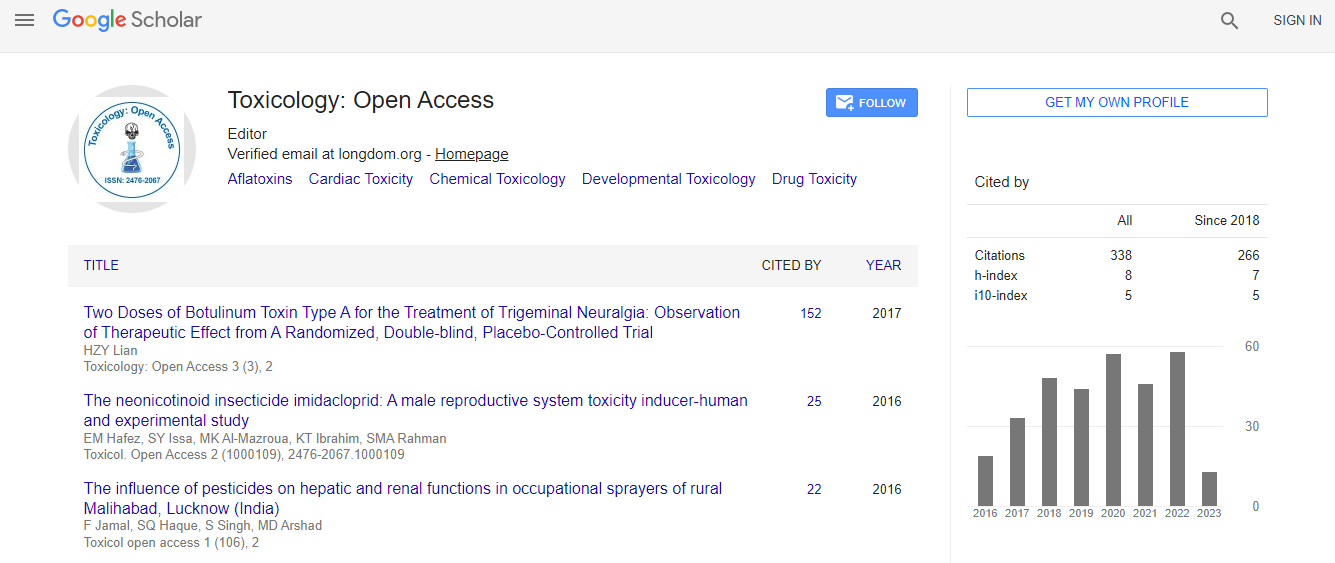Our Group organises 3000+ Global Conferenceseries Events every year across USA, Europe & Asia with support from 1000 more scientific Societies and Publishes 700+ Open Access Journals which contains over 50000 eminent personalities, reputed scientists as editorial board members.
Open Access Journals gaining more Readers and Citations
700 Journals and 15,000,000 Readers Each Journal is getting 25,000+ Readers
Google Scholar citation report
Citations : 336
Toxicology: Open Access received 336 citations as per Google Scholar report
Indexed In
- Google Scholar
- RefSeek
- Hamdard University
- EBSCO A-Z
- Geneva Foundation for Medical Education and Research
- Euro Pub
- ICMJE
Useful Links
Related Subjects
Share This Page
Anti-neuroinflammation of brain-derived neurotrophic factor in microglia
8th World Congress on Toxicology and Pharmacology
Chingju Lin, Sheng-Wei Lai, Cheng-Fan Tsai and Dah-Yuu Lu
China Medical University, Taiwan
Posters & Accepted Abstracts: Toxicol Open Access
Abstract
In the Central Nervous System (CNS), microglia plays a crucial role in innate immune processes. The hallmark of neuroinflammation is considered to be microglial activation that leads to the production of excessive proinflammatory molecules. Hence, inhibition effects on microglial over-activation are major strategy to counter balance neurodegenerative progression. Brain-derived neurotrophic factor (BDNF) is one of the major neurotrophic factors to maintain development and survival of neurons in the brain. However, how BDNF signalling participates in modulating neuroinflammatory responses remains unknown. Recent studies have shown that BDNF is produced by astrocytes. Here, we reported experiments using supplements with exogenous BDNF to examine the neuroprotective effects. BDNF causes decrease of cyclooxygenase-2 (COX- 2) as well as numerous proinflammatory cytokines. We found that BDNF resulted in increased expression of erythropoietin (EPO) and sonic hedgehog (Shh) in microglia, this result causes further inhibition of inflammation effect. In addition, astrocyte also acts through the endogenous mechanism to regulate microglia by increasing neuroprotective factor. The phosphorylated adenosine monophosphate-activated protein kinase (AMPK)-�± was mediating anti-neuroinflammatory responses in microglia. In this study we provide the BDNF-EPO-Shh novel-signalling pathway involved in anti-inflammatory response via astrocytemicroglia endogenous regulation.Biography
Chingju Lin is an Associate Professor at the Department of Physiology at China Medical University, Taichung, Taiwan. In recent years, neuroinflammation has been reported to be associated with the pathogenesis of neurodegeneration diseases. Her research interests focus on studying the relationship between neuroinflammation and neurodegeneration. She is also interested in investigating Chinese herbal compounds or chemicals exerting anti-inflammation effects and their potentials to be therapeutic drugs in treating neurodegeneration diseases.
Email: clin33@mail.cmu.edu.tw

 Spanish
Spanish  Chinese
Chinese  Russian
Russian  German
German  French
French  Japanese
Japanese  Portuguese
Portuguese  Hindi
Hindi 